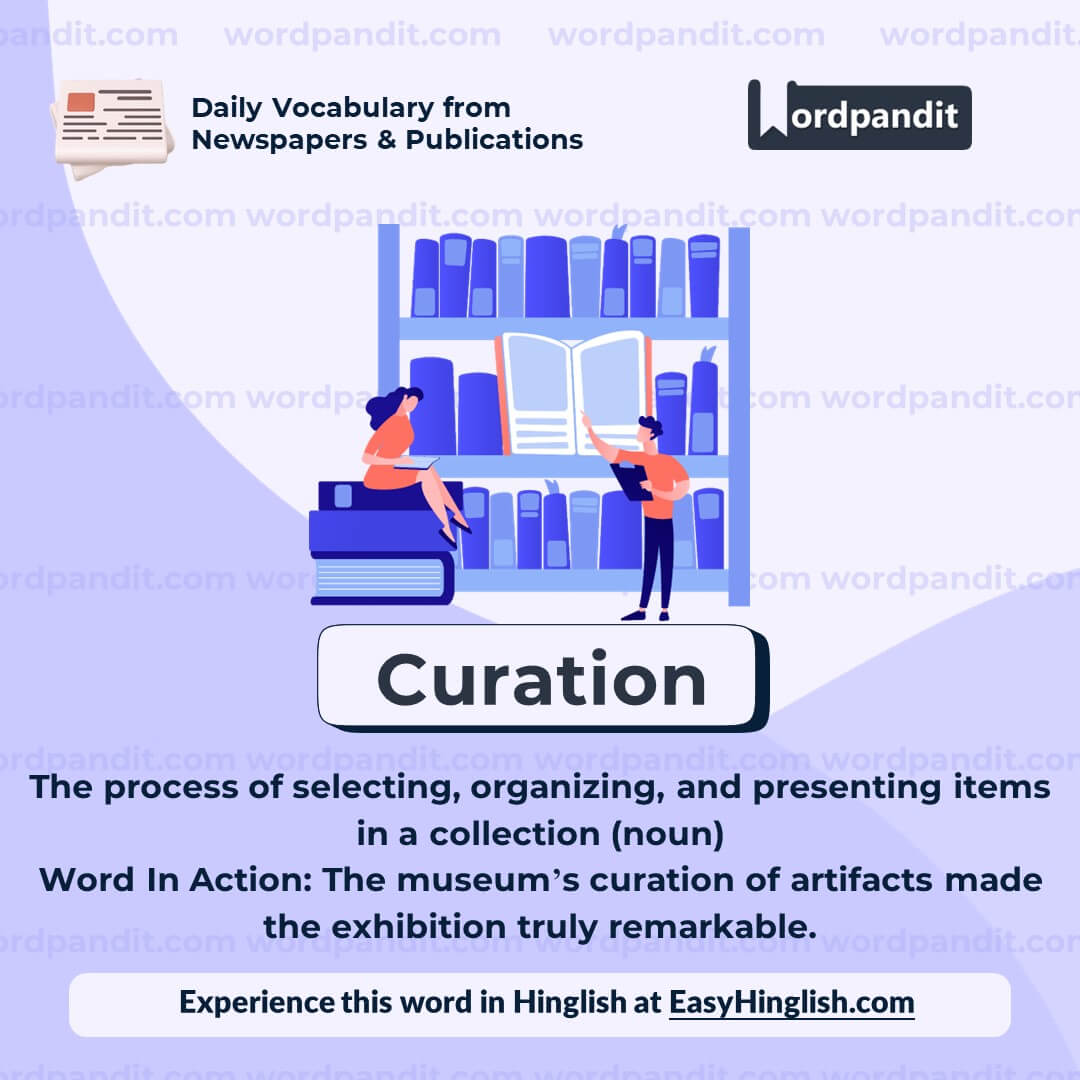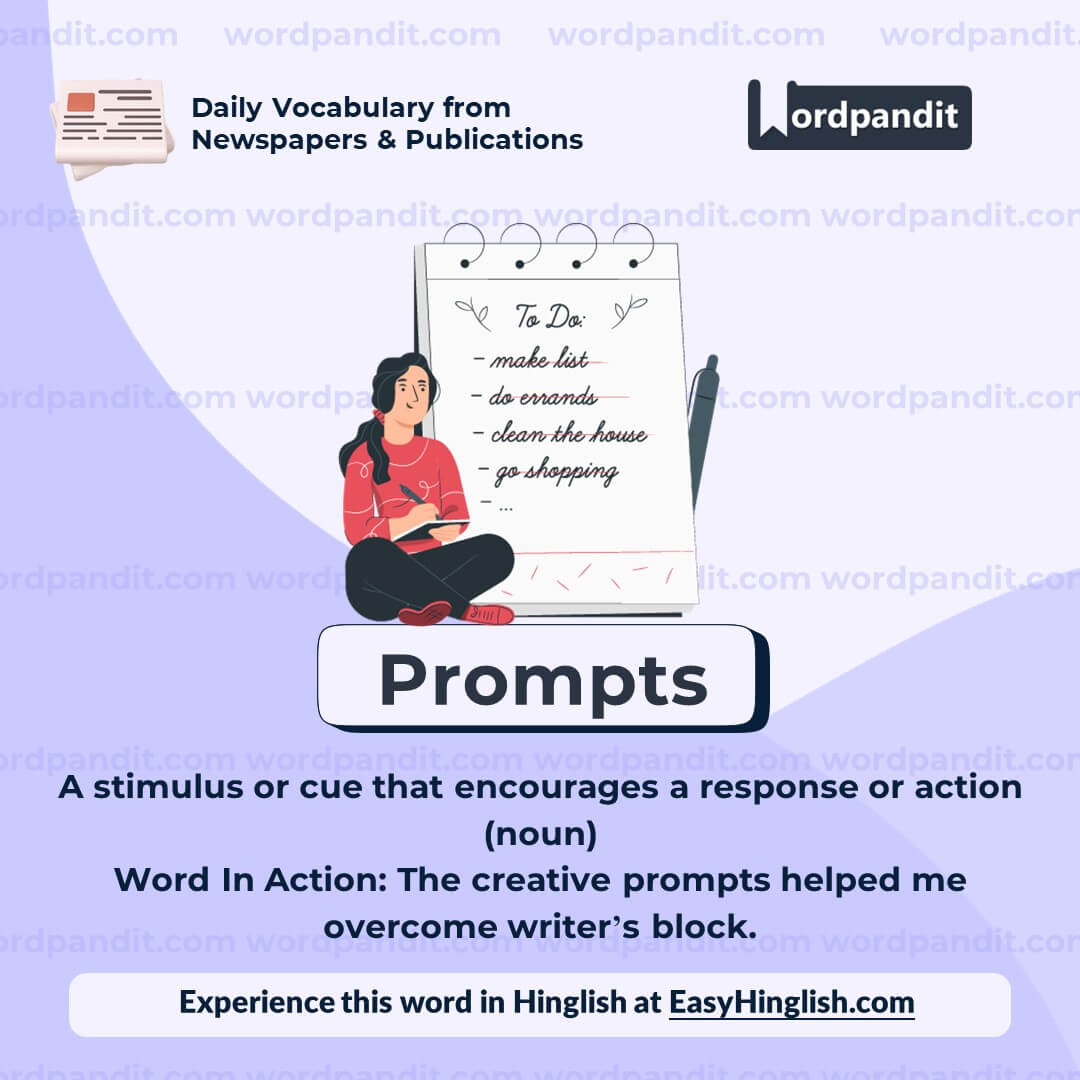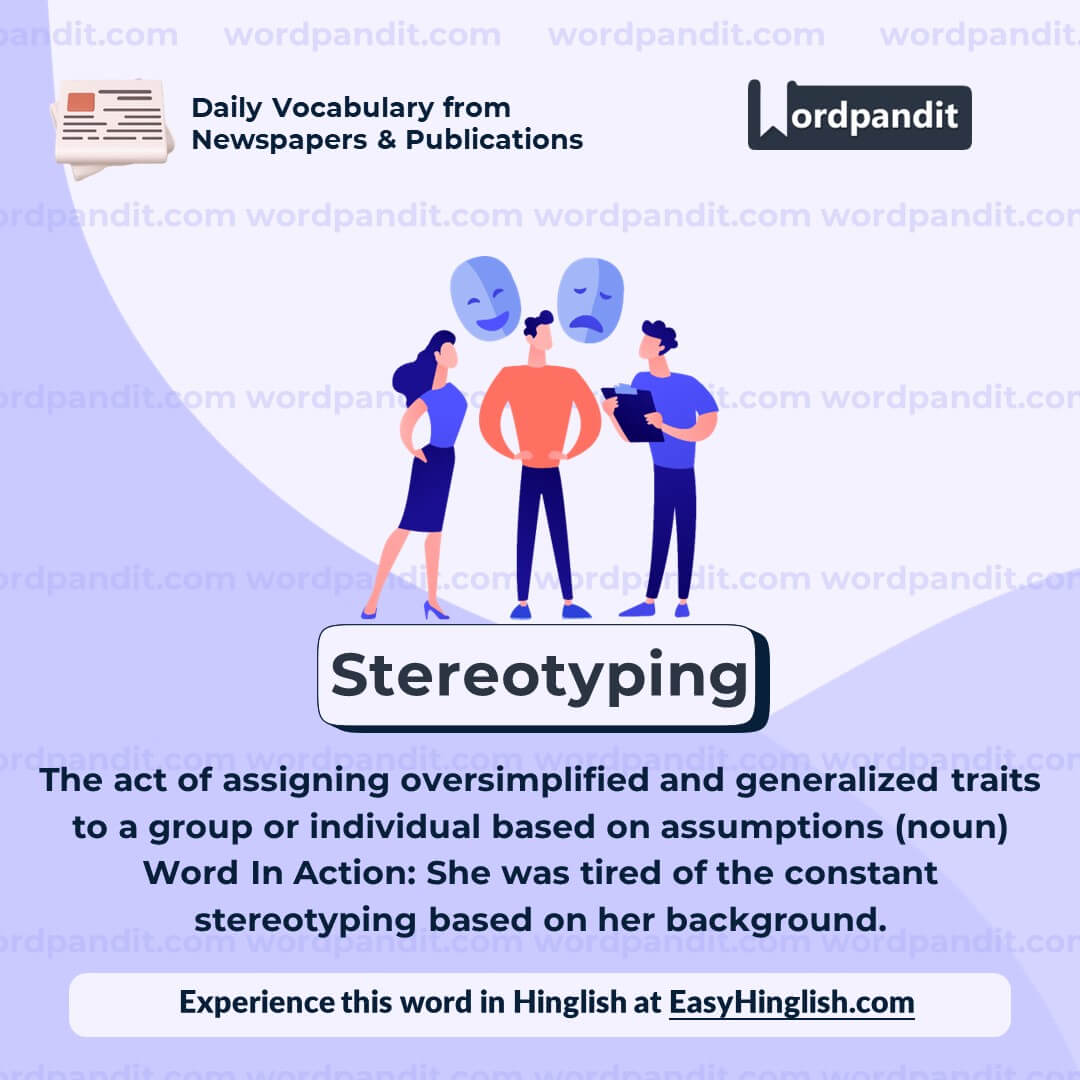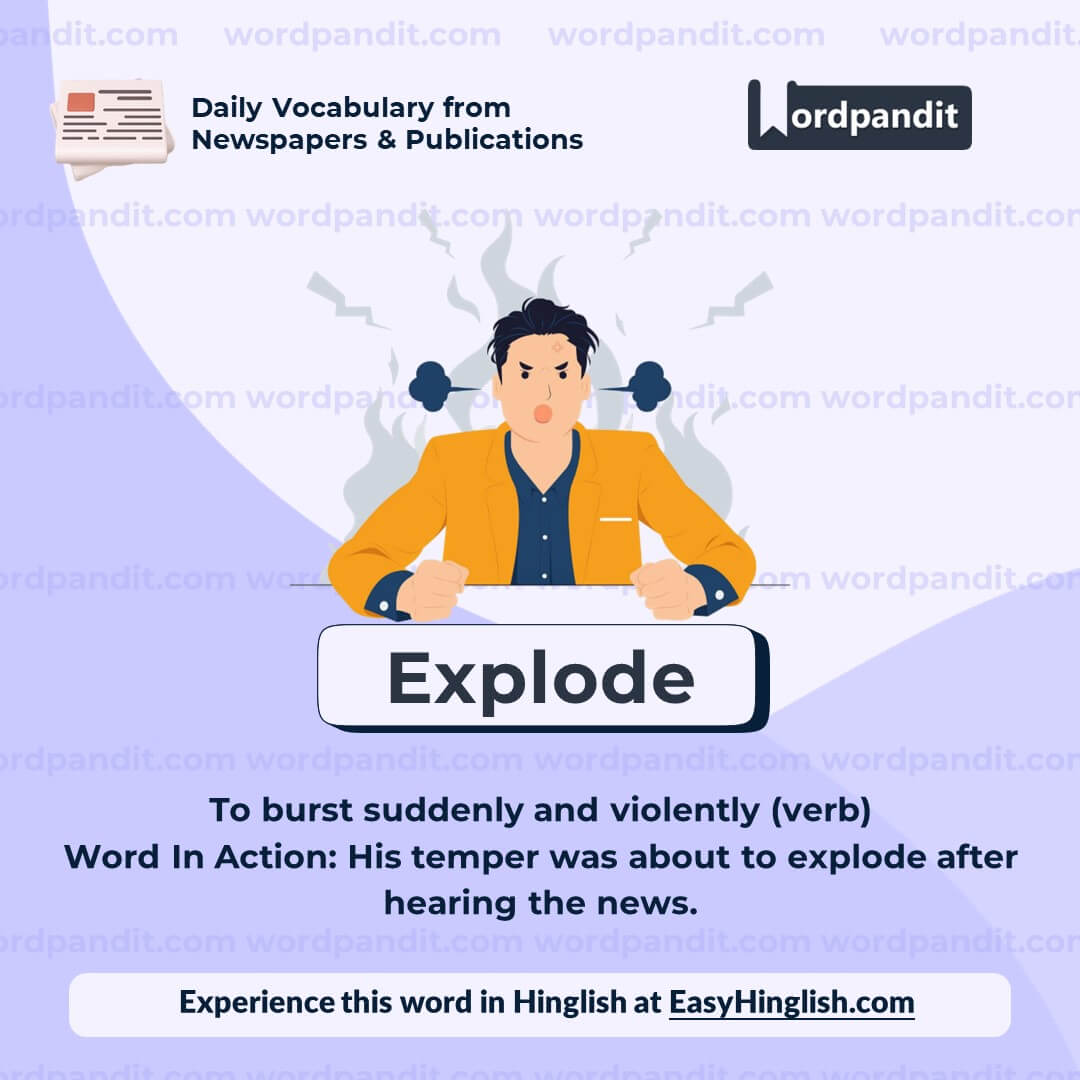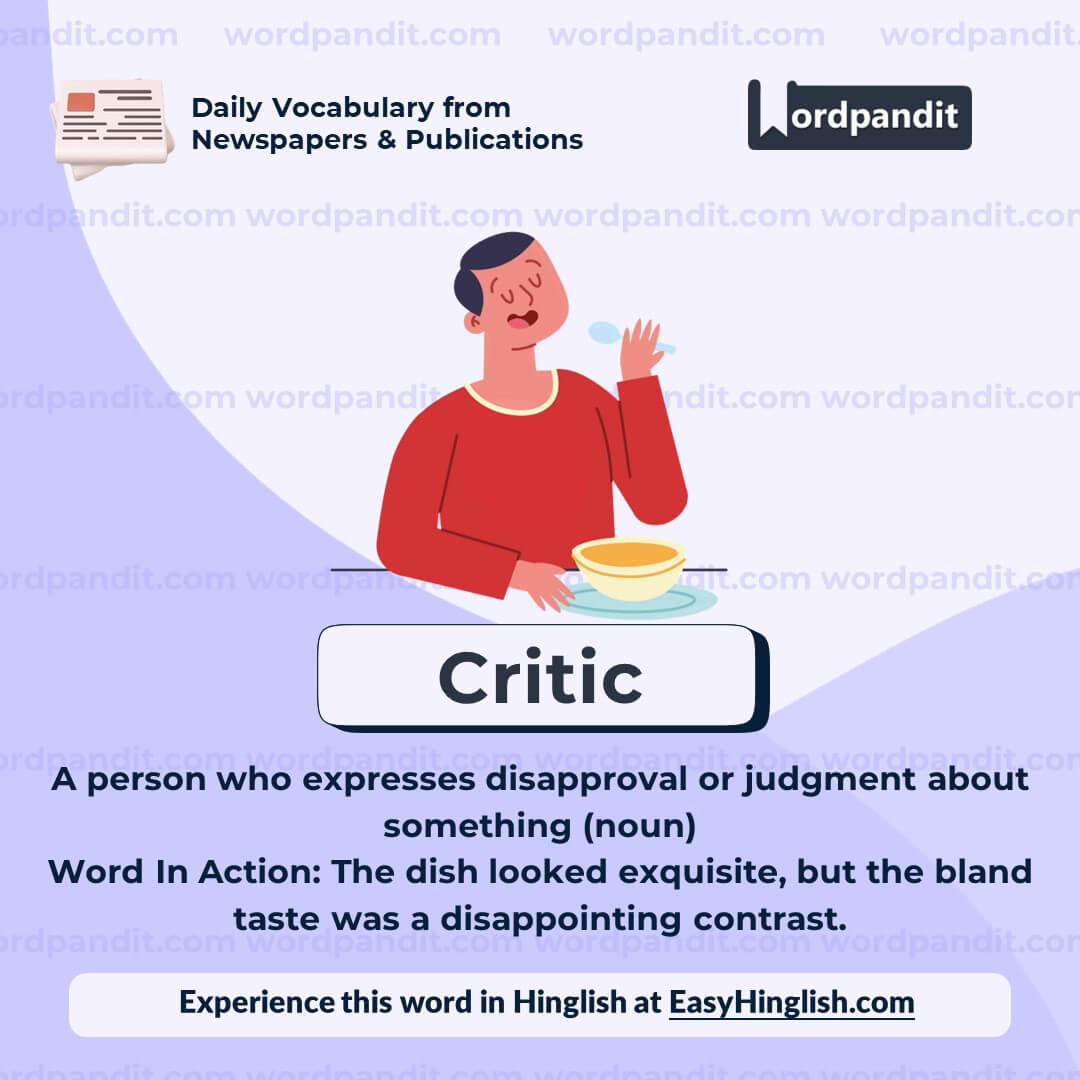Daily Vocabulary from International Newspapers and Publications
Expand Your Vocabulary with Wordpandit’s Global Vocabulary Hub
At Wordpandit, we are committed to helping you develop a truly global vocabulary by drawing from some of the most respected international publications. This section is designed to keep you ahead of the curve by introducing you to words that define global conversations and trends.
The Power of Global Sources
To help you think and communicate on a global scale, we curate vocabulary from renowned international sources, such as:
- The New York Times
- The Washington Post
- BBC
- The Guardian
- The Economist
- Scientific American
- Psychology Today
- And many more...
Stay Global, Stay Competitive
Our daily updates from international publications ensure you are consistently exposed to new words that reflect global news and developments, making sure your vocabulary is not only current but also globally relevant.
Enhance Your Global Perspective
Whether you’re preparing for international exams, aiming to excel in global business communication, or want to enhance your language skills for personal growth, Wordpandit offers the resources you need to thrive in a global context.
Effective Learning, Global Reach
Our learning methodology combines global examples, memory aids, and interactive activities, allowing you to internalize new words effectively and apply them in real-world scenarios.
Begin Your Global Vocabulary Journey Now!
Why Choose Wordpandit?
Practical Learning: Focus on words you'll actually encounter in real-world reading, enhancing your comprehension and communication skills.
Diverse Content: From current affairs to scientific breakthroughs, our varied sources expose you to vocabulary across multiple domains.
Effortless Integration: Make Wordpandit a part of your daily routine. Just a few minutes each day can significantly boost your lexicon over time.
Your Path to Vocabulary Mastery
- Visit our Daily Vocabulary section regularly
- Explore new words and their usage in context
- Practice incorporating these words into your own writing and speech
- Track your progress as your vocabulary expands
Start Your Journey Today
Embark on your vocabulary enhancement journey with Wordpandit. By consistently engaging with our daily posts, you'll build a robust vocabulary that serves you well in academic, professional, and personal contexts.
Remember, a word a day keeps linguistic limitations at bay. Make Wordpandit your daily companion in the quest for vocabulary excellence!
WORD-1: Curation
Context:
"The ambitious curation by the photography academic Michel Poivert gathers together 17 projects at Brussels’ Hangar gallery." - The Guardian
Explanatory Paragraph:
"Curation" refers to the careful selection, organization, and presentation of items, often in a museum, gallery, or exhibition. It is the process by which experts, called curators, choose and arrange materials to convey a theme, story, or perspective. This word is also commonly used in digital and content spaces, such as social media and playlists, where content is thoughtfully gathered and displayed.
Meaning: The process of selecting, organizing, and presenting items in a collection (noun).
Pronunciation: kyoo-RAY-shun
Difficulty Level: ⭐⭐⭐ Intermediate
Etymology: Derived from the Latin word "curare," meaning "to take care of" or "to attend to," which evolved into "curation" in English.
Synonyms & Antonyms:
Synonyms: Selection, compilation, organization, arrangement
Antonyms: Disorganization, neglect, randomness
Usage Examples:
- The museum’s curation of ancient artifacts provided a fascinating insight into early civilizations.
- Effective content curation on social media can help brands engage with their audience more effectively.
- The music festival's curation of artists focused on emerging talents from around the world.
- She is known for her meticulous curation of vintage furniture in her boutique store.
Cultural Reference:
"Curation is an art form in itself, requiring a deep understanding of both the subject and the audience." - A common perspective in the art and museum industry.
Think About It:
How has digital curation transformed the way we consume content in the modern world?
Quick Activity:
Create a digital curation project by selecting five articles, images, or videos that revolve around a single theme, such as "innovation in technology" or "the future of education."
Memory Tip:
Think of a "curator" as someone who "cares" for a collection. The word "curation" comes from "curare," meaning "to take care of."
Real-World Application:
From museums to online content, curation plays a crucial role in organizing information effectively. Businesses, influencers, and educators all use curated content to enhance learning and engagement.
WORD-2: Prompts
Context:
"Using the software’s literal language prompts, they wanted to see how they could recreate some of the world’s most famous photographs." - The Guardian
Explanatory Paragraph:
The word "prompts" refers to cues or stimuli that encourage a response or action. In the context of technology and artificial intelligence, prompts are inputs or instructions given to a system, such as chatbots or image-generating software, to guide their output. More generally, prompts can be reminders, questions, or statements that encourage thought, speech, or action in various scenarios, such as writing exercises or theater performances.
Meaning: A stimulus or cue that encourages a response or action (noun).
Pronunciation: prompts (rhymes with "romps")
Difficulty Level: ⭐⭐ Beginner
Etymology: Derived from the Latin word "promptus," meaning "brought forth" or "ready," which later evolved in Middle English to mean "encouragement to act."
Synonyms & Antonyms:
Synonyms: Cue, trigger, stimulus, suggestion
Antonyms: Suppression, discouragement, hindrance
Usage Examples:
- The teacher provided writing prompts to help students develop their storytelling skills.
- AI models generate responses based on user prompts, making interactions more dynamic.
- Her nervousness disappeared when she saw the acting prompts on the cue cards.
- Memory prompts, such as sticky notes, help people stay organized and remember important tasks.
Cultural Reference:
"Writing prompts have fueled creative minds for centuries, from Shakespearean sonnets to modern-day screenplays." - A common thought in the literary world.
Think About It:
How do different types of prompts influence creativity and problem-solving?
Quick Activity:
Write a short paragraph based on this prompt: "Imagine waking up in a world where everyone communicates using only images and symbols. How would you express your thoughts?"
Memory Tip:
Think of a "prompt" as a small "push" or "nudge" that helps guide action—whether in thinking, writing, or speaking.
Real-World Application:
Prompts are essential in AI-driven tools like ChatGPT, creative writing workshops, and public speaking training. They help guide responses, improve communication, and stimulate creative thinking.
WORD-3: Stereotyping
Context:
"The work was made between 2022 and 2023 and really highlighted the flaws and prejudices in source data, questioning the role of the internet in appropriation and stereotyping." - The Guardian
Explanatory Paragraph:
"Stereotyping" refers to the act of assigning fixed, oversimplified, and generalized characteristics to a group of people, often based on race, gender, nationality, or other attributes. Stereotypes can be misleading and harmful, as they ignore individual differences and perpetuate biases. In modern discussions, stereotyping is often examined in social sciences, media studies, and discussions on inclusivity.
Meaning: The act of assigning oversimplified and generalized traits to a group or individual based on assumptions (noun).
Pronunciation: STAIR-ee-oh-ty-ping
Difficulty Level: ⭐⭐⭐ Intermediate
Etymology: Derived from the Greek word "stereos" (solid, firm) and the French word "type" (impression, kind), originally referring to printing plates used to create fixed images.
Synonyms & Antonyms:
Synonyms: Generalization, oversimplification, bias, labeling
Antonyms: Individualization, diversity, fairness, open-mindedness
Usage Examples:
- The movie was criticized for stereotyping certain cultural groups instead of portraying them authentically.
- She realized she had been stereotyping her classmates and decided to get to know them individually.
- Media plays a powerful role in shaping perceptions, sometimes reinforcing harmful stereotyping.
- Breaking free from stereotyping requires challenging assumptions and seeking diverse perspectives.
Cultural Reference:
"Stereotypes are but the shadows of truth." - A thought-provoking idea often discussed in psychology and sociology.
Think About It:
Can you think of a stereotype that has changed over time due to societal progress?
Quick Activity:
Think of a common stereotype you’ve heard. Now, write a short paragraph explaining why it is inaccurate or misleading.
Memory Tip:
Remember: "Stereotyping" creates a "solid type" (unchangeable idea) about people, but in reality, individuals are diverse and unique.
Real-World Application:
Understanding stereotyping is essential in education, media, and workplace diversity training. Recognizing biases can help create a more inclusive and fair society.
WORD-4: Explode
Context:
"These things don't work, I've had them many times, and on occasion, they break, they explode." - BBC
Explanatory Paragraph:
The word "explode" means to burst or break apart violently, often with a loud noise. It is commonly used to describe physical explosions, such as bombs or fireworks, but it can also refer to emotions, arguments, or even sudden increases in something (e.g., "His popularity exploded overnight"). The term conveys a sense of rapid, forceful expansion or reaction.
Meaning: To burst suddenly and violently (verb).
Pronunciation: ik-SPLOHD
Difficulty Level: ⭐⭐ Beginner
Etymology: From the Latin "explodere," meaning "to drive out by clapping," which evolved into the modern sense of bursting or erupting.
Synonyms & Antonyms:
Synonyms: Burst, detonate, erupt, shatter
Antonyms: Implode, deflate, contract, subside
Usage Examples:
- The fireworks exploded in the night sky, lighting up the city.
- She exploded with anger when she found out about the mistake.
- The gas leak caused the building to explode suddenly.
- Interest in electric cars has exploded in recent years.
Cultural Reference:
"Michael Bay's action movies are famous for their spectacular explosions, making 'exploding cars' a signature Hollywood effect." - Film Criticism
Think About It:
Can you think of a situation where emotions can "explode" just like physical objects? How can we manage such emotional outbursts?
Quick Activity:
Write a short story where something unexpected explodes—whether it's a balloon, a volcano, or even a surprise party!
Memory Tip:
Think of an "explosion" as something that "explodes" outward, expanding rapidly and powerfully.
Real-World Application:
The word "explode" is frequently used in news reports, movies, and discussions about sudden growth, making it a versatile term to understand in both literal and figurative contexts.
WORD-5: Critic
Context:
"Trump has been a long-standing critic of paper straws." - BBC
Explanatory Paragraph:
A "critic" is a person who evaluates, analyzes, or expresses opinions about something, often pointing out faults or shortcomings. The word can refer to someone who reviews art, literature, or films professionally, as well as anyone who disapproves of or challenges an idea, policy, or product. While critics can provide valuable feedback, their opinions may sometimes be subjective or controversial.
Meaning: A person who expresses disapproval or judgment about something (noun).
Pronunciation: KRIT-ik
Difficulty Level: ⭐⭐ Beginner
Etymology: From the Greek "kritikos," meaning "able to judge or discern," which evolved into the Latin "criticus" and later into the English "critic."
Synonyms & Antonyms:
Synonyms: Reviewer, evaluator, analyst, opponent
Antonyms: Supporter, advocate, admirer, proponent
Usage Examples:
- The movie critic gave the latest blockbuster a disappointing review.
- She has been a vocal critic of the new government policies.
- Despite the critics, the artist continued to follow his unique style.
- As a food critic, he travels the world tasting and reviewing different cuisines.
Cultural Reference:
"The role of a critic is not to be destructive but to help others see things in a new light." - A common perspective in journalism and the arts.
Think About It:
Do critics help improve society by pointing out flaws, or do they sometimes discourage creativity? What do you think?
Quick Activity:
Write a short review (positive or negative) of a book, movie, or product you have recently used. Try to be a fair critic!
Memory Tip:
Think of a "critic" as someone who "critiques" or judges something, whether it's a movie, a policy, or an idea.
Real-World Application:
Critics play a crucial role in journalism, business, and entertainment. Understanding their viewpoints can help people make informed decisions and improve their work based on feedback.



